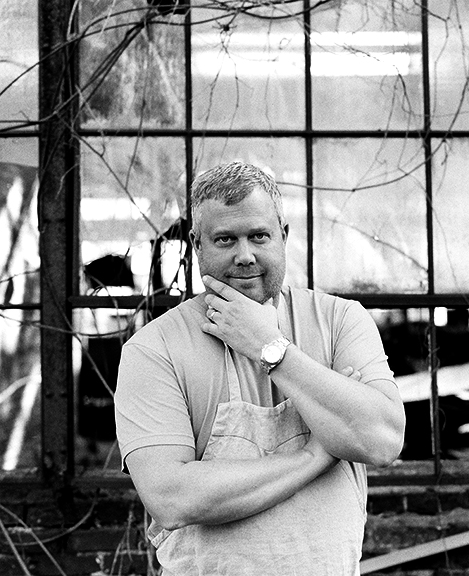

Chef Ford Fry, Photo Credit: Ford Fry
Plenty of chefs found inspiration during childhood while cooking with their family, but Ford Fry’s first food memories perfectly encapsulate the successful restaurateur’s deep-rooted independence, strong work ethic and business-minded approach.
“When I was a kid — I call this my first business — I sold mini burgers out of my house,” recalls Fry with a smile. “My mom would go buy all this ground meat and I’d go cook it and then I’d sell it and I’d take the money. So, I pretty much invented the slider!”
Years later, when Fry was an uninspired undergrad, his dad suggested he enroll in culinary school, where he found his true passion.
“I’d work 40 hours on the clock as a cook, then 40 hours off the clock,” he says. “I felt like if I could get two years of experience in one year, I’d do that.”
That intense drive is what’s gotten the James Beard Foundation Award-nominated chef where he is today. After years of fine-dining experience in the kitchens of luxury hotels like Forbes Travel Guide Five-Star The Ritz-Carlton, Naples and the Four-Star Ojai Valley Inn & Spa, the culinary maestro is now running 10 acclaimed Atlanta restaurants (including beloved The Optimist and King + Duke) plus State of Grace in his hometown of Houston.
This summer, Fry will open a Tex-Mex diner and taco truck near the Atlanta Braves’ SunTrust Park and, early next year, he will launch his first restaurant in Charlotte followed by a triple concept in Nashville.
When he’s not cycling between his eateries, the energetic chef finds inspiration by traveling and exploring different cities’ food scenes. During a recent stop in Austin, we were able to snag some of his time to chat about work-life balance, the power of teamwork and how everything really is bigger in Texas.
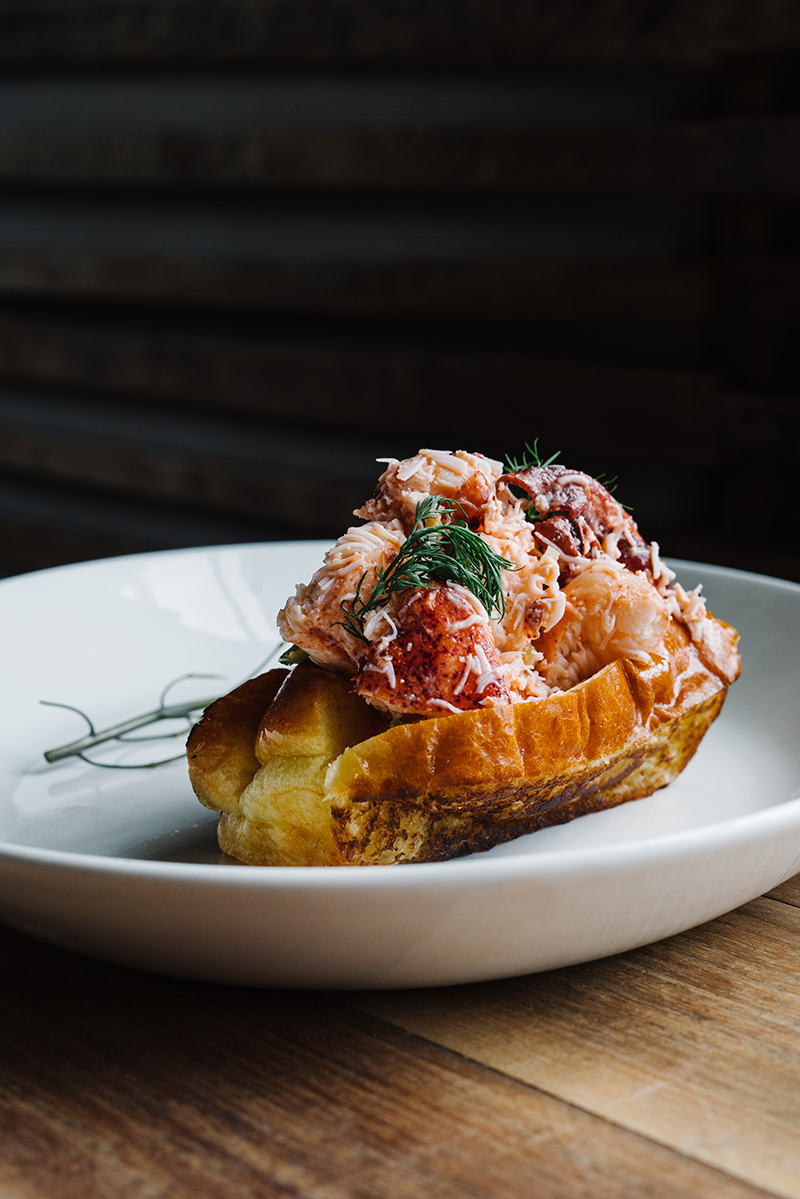
The Optimist’s Lobster Roll, Photo Credit: Andrew Thomas Lee
When was the last time you were in Austin? Any favorite spots you like to visit here?
I come back to Texas about six or seven times a year for State of Grace — just not in the summer!
Clark’s [Oyster Bar] is one of my repeats — it’s just solid. And I’ve been to June’s [All Day] twice since I’ve been here. I feel like McGuire Moorman Hospitality kind of does what we do in Atlanta, as far as the décor, but maybe a little better when it comes to the quirkiness of the décor. And they’re really into music like we are. So, I get a lot of inspiration from what they are doing.
I also loved the Texas-plus-Japanese [cuisine] at Kemuri [Tatsu-ya]. I think I smelled like smoke when I left there, which I’m totally good with!
What do you miss about Texas in general?
I like the amount of space everything has, whereas in other cities, everything’s all jammed in there. But look at Guero’s Taco Bar — you’ve got the restaurant and then next door is this lot where they can pack people in and do live music. Same thing with Justine’s Brasserie, where we went last night — they’ve got a whole side area.
But one of the main things I miss about Texas is the weekend trips to New Braunfels, Gruene, San Antonio, tubing on the Comal River. Those are some of my best memories from Texas.
What was the state of Tex-Mex in Atlanta before you opened The El Felix and Superica?
Tex-Mex, as I knew it, was pretty nonexistent. We did have a couple of chains, but the city was lacking Tex-Mex with real individuality and soul.
I grew to love the cheese enchiladas at Nuevo Laredo, but other than that, we were missing more personalized experience and taste.
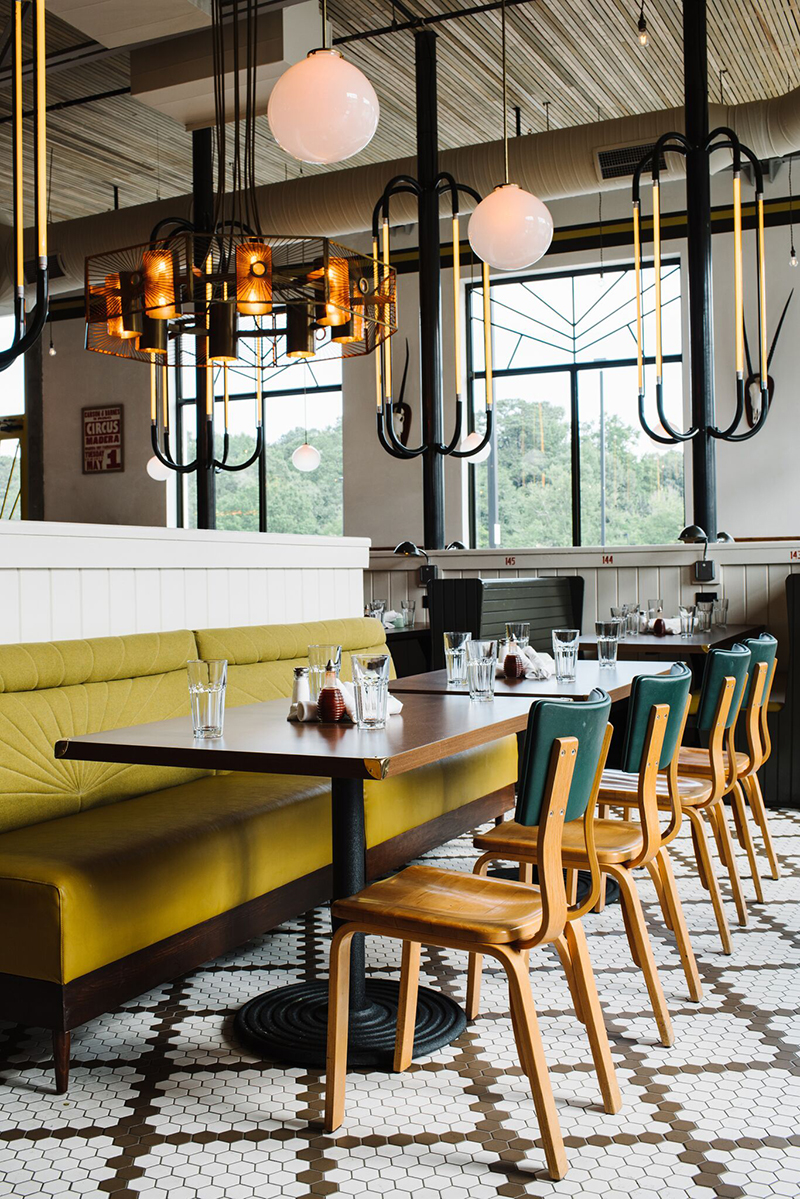
Superica, Photo Credit: Andrew Thomas Lee
What would you say has changed most noticeably about the food world in the South?
I’ve noticed that a lot of times the dining is shifting into neighborhoods, which is so much cooler than where it used to be.
When I first started, I picked an offshoot neighborhood instead of a main pipeline of the city, where usually those were the highest rents but also the busiest restaurants. Now those main pipelines, in my opinion, people don’t want to go there anymore. They want to go off to the little Launderettes and these little neighborhoods where it’s real and feels more genuine.
What is your favorite city for food right now?
Probably L.A. It was Portland, but then I went back and it was a little disappointing. But there is some cool stuff in L.A. Night + Market is killer. Gjelina is really interesting and so is their little sandwich place Gjusta.
Sqirl, for breakfast, is cool — that owner is from Atlanta. Republique, in the old Campanile space, was really cool for the experience and the amazing space. And their bread and butter was awesome. Fishing with Dynamite was fun — he’s a friend of mine — but it’s in Manhattan Beach, which is a hike in L.A. But I’m ready to go back.
How do you maintain a work-life balance when opening up so many restaurants in the past few years?
I make sure I’m planning time with family every month, whether for a weekend to our ranch house, a longer vacation or even just a Sunday spent barbecuing at home by the pool.
I’m also incredibly lucky to have an amazing and talented team of executive chefs who I give the reins in terms of creativity with the menu, and operations. It’s because of these talents, many of which we bring up within the Ford Fry Restaurants family, that I’m able to do what I do as a restaurateur.
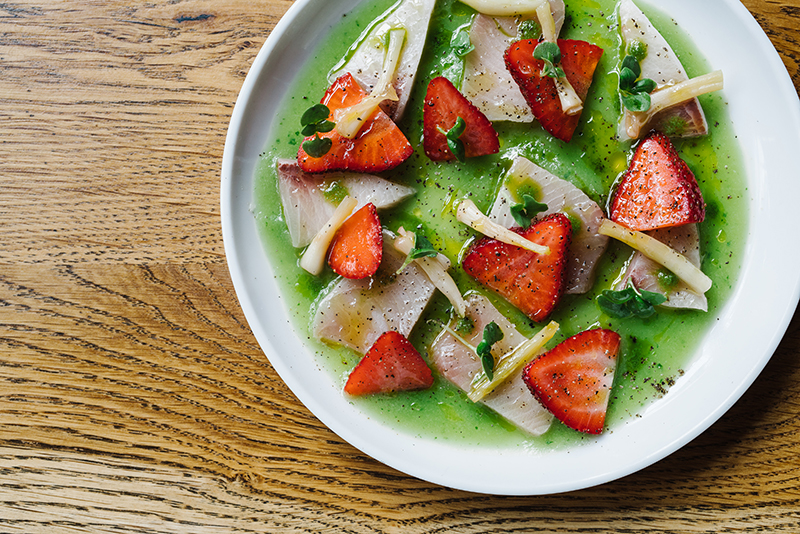
King + Duke’s Hamachi Crudo, Photo Credit: Andrew Thomas Lee
Can you talk a little bit about how your restaurant group’s unique structure and how you empower your chefs?
We have this organization of VPs. So I have a COO [Toby Franklin], and he’s awesome. And then we have VP chefs, VP front-of-the-house [staff] and the executive chefs.
I was watching these chefs and it’s like — what do you do when you get to a certain point and you don’t have your own place but you don’t have the money for your own place? So I thought, maybe, I could help with this and get them a piece of the pie, without having to put up any money, while learning how to open their own place. So now they’re making way more money than they would as an executive chef.
“Servant leadership” is what I call it. Because I’m serving them to get them to the next level and give them the credit as much as I can. We give them the tools. I usually set up the business model and the concept for the restaurant — this is what we’re going to do and this is our price point — and I’ll show them why I think that works. And then we’ll find a chef who’s moving up from within, or sometimes we bring them in from the outside, but someone who’s passionate about it, and we let them go for it.
On the menu at BeetleCat, I’ll put “Executive chef: Andrew Isabella,” and then it’ll say “Deckhand: Ford Fry.” Or I’ll put myself as “the executive shucker,” or just as “the cook” or something silly like that. I mean, people are smart; they know I’m not there — I can’t be at all of them!
What keeps you inspired?
I love new ideas, and I have a hard time saying no. Every opportunity that comes our way, I want to look at how can we do it rather than why we shouldn’t do it. And then, of course, I have people who talk me down sometimes.
A lot of it is seeking out what the community needs as opposed to just putting something I want to put there. And it has to be something I’m really passionate about. So if they need it and I’m passionate about it…I just like to do the right thing in every situation and then, hopefully, it comes back around. And so far it has! So that’s what keeps me going.
It’s about doing right for the city but also doing right for the restaurants in the city, which, in a sense, is best for the city — to give a broader appeal and more options. Growing thoughtfully is the idea, I guess. That’s the goal.
Where do you get your inspiration for interior design?
I’m often inspired by history and nostalgia for design trends of the past. For example, at BeetleCat, our first-floor level is modeled after a ’70s-era surf hangout with bold vintage patterns and earth tones, while the upstairs takes elements from ’80s-inspired shore style.
Many elements at State of Grace in Texas remind me of the old-school country club in Houston my parents used to take the family to every week, and King + Duke takes a lot of inspiration from colonial-American elements like dark wood shelving and literature lining the walls.
I like when people can find something they relate to and find comfort within the space. We work with several design firms, including Meyer Davis, which won a James Beard Award this year for the design of St. Cecilia, our bright, airy restaurant with a coastal Italian aesthetic featuring lots of cream colors, whites and blues.
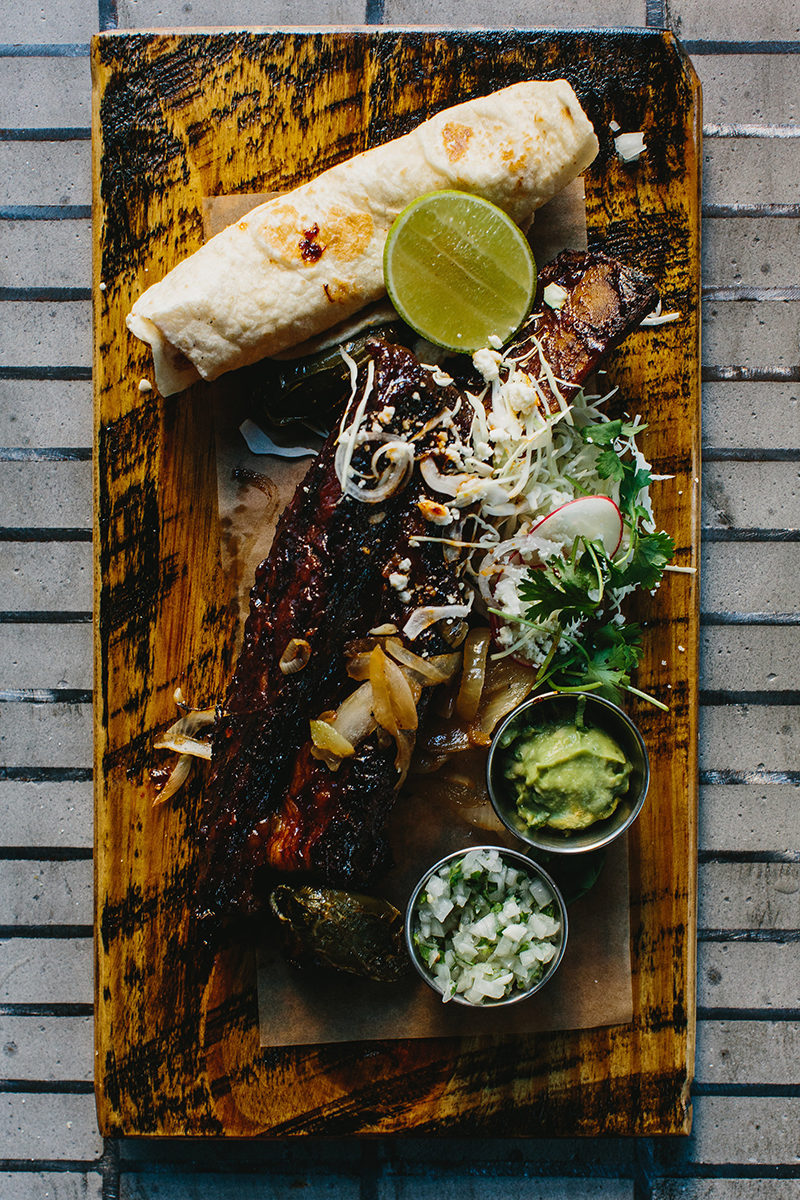
Deliciousness From The El Felix, Photo Credit: Andrew Thomas Lee
How did you choose Charlotte and Nashville for your next restaurants?
I play music and love Nashville’s whole scene, and I love old buildings. So, typically we go to the towns that are right around the Southeast, that are easier to get to, and Nashville and Charlotte are two of the larger ones.
And then the location kind of dictates what’s going to be there. So Charlotte, it happened to be Tex-Mex, because of the size of the building and the lack of Mexican food in the city. That will be a Superica, opening in the first quarter of 2018.
And Nashville’s [location] is in Germantown, and that’s kind of a three-restaurant thing. Nashville barely has any seafood. It’s always been kind of a catfish town. But we found this old, cool building where, in the 1800s, they made the handles for axes and hammers. So it’s an old hammer mill and it’s a pretty big building. We’re going to do a seafood-focused restaurant, kind of like The Optimist.
Then, upstairs we’ll do a cocktail lounge-oyster bar kind of like Maison Premiere.
And then in the back, on the first level, I kind of want to do our version of a honky-tonk. If you look at Robert’s Western World on Broadway, they have this little kitchen stuck into the bar, where they’re frying chicken tenders — kind of like a snack bar. We’re going to make our own snack bar but it’ll be kind of like a taqueria— tostadas, shrimp tacos dorados, the real recognizable, comfort-y good tacos.
And then there will be a stage in there because we were talking to a producer who said, it’s hard to believe, but there’s a lack of listening rooms where people can come listen to new talent — and there’s so much new talent in Nashville.
And what will this Nashville triumvirate be called?
I haven’t even told my partners yet! But I will tell you that all three [concepts] are based on Jack London books.
